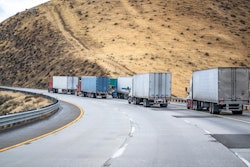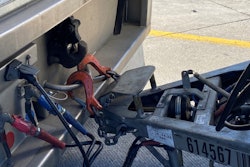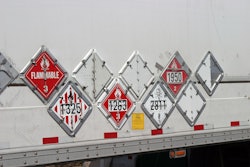Battery electric trucking is an almost $1 trillion proposition, and that doesn't include the cost of acquisition for the actual trucks, according to a report released Tuesday by the Clean Freight Coalition (CFC), an alliance of truck transportation stakeholders whose founding members include the American Trucking Associations and Truckload Carriers Association, among others.
The group pegs full electrification of the U.S. medium- and heavy-commercial truck fleet at a cost of nearly $1 trillion in infrastructure investment alone: upwards of $620 billion from the trucking industry in chargers, site infrastructure and electric service upgrades, and $370 billion from utilities in upgrades to grid networks to meet the surge in demand of just commercial vehicles.
The report, which comes almost exactly one year since the Clean Freight Coalition's founding, was compiled by Roland Berger, an international management consultancy headquartered in Munich, Germany.
The utilities' share of the financial burden is "nearly the equivalent of what was spent on the entire power distribution system over the past 15 years," said Dr. Wilfried Aulbur, Roland Berger senior partner responsible for the firm's global commercial vehicle, construction and agricultural business.
Local vehicles would require an investment in on-site charging infrastructure of $496 billion, but heavy-duty vehicles will require more significant charging infrastructure and investment compared to medium-duty — needing an average charging infrastructure investment of $145,000 per vehicle for heavy-duty vs $54,000 per medium-duty truck, according to the report. In addition to on-site charging infrastructure, long-haul vehicles (most of which are Class 7-8) will require an investment of $69 billion into a reliable local on-route charging network before fleets can even electrify.
"An industry with a yearly turnover of about $800 billion and a profit margin around 5% cannot invest $620 billion without financial support or a significant increase in freight rates," Aulbur said.
Looming 'massive' freight rate increase
For perspective on the level of investment needed on infrastructure to support battery electric trucking, a lift for which the transportation industry would shoulder more than 60%, American Truck Dealers President Laura Perrotta said commercial truck dealers over the last decade have already invested nearly $1 billion to sell and service EVs — less than .1% of trucking's share of the estimated $1 trillion dollar need. Dealers too struggle with, she said, BEV challenges unrelated to cost.
"... dealers are faced with inadequate charging infrastructure, delays when installing chargers due to parts shortages and utility workload challenges, and unaffordable upgrades required to meet new electricity demands," Perrotta added.
American Trucking Associations President and CEO Chris Spear noted the industry's commitment to zero emissions, having removed nearly 99% of all tail pipe emissions over the last 40 years, but he has long advocated that the "mad dash to zero [emissions]" exposes the supply chain to "a $1 trillion unfunded mandate" that isn't included in the Biden administration's infrastructure funding plan and has "enormous consequences for the American consumer."
"Those costs [to electrify] are going to get passed on. They're going to be very, very high [freight] rates," Spear added. "Going all-in on electrification right now is going to be catastrophic to the economy and to what consumers pay."
The move to a new powertrain, Aulbur said, will require a new operating model for fleets.
"We don't have a business model that allows fleets to do this by themselves," he said. "You won't find fleets to buy electric trucks just to buy electric trucks. If it doesn't make money, there's no one that's going to invest in this technology."
The evolving business model to support investment, Aulbur said, would come with a "massive" increase in freight rates, but Spear said it won't be as simple as passing along costs to cover zero emission-related expenses. Despite some early successes by large fleets who have integrated electric trucks into parts of their operation, Spear said there has already been some pushback from fleet customers on the increased costs that support these same trucks.
Fuel agnostic approach, not saying 'no'
National Association of Truck Stop Operators President and CEO Lisa Mullings noted her members want to sell whatever fuel customers want to buy, but added the Environmental Protection Agency hasn't considered all the challenges faced when converting from fossil fuel refueling to electric battery charging: namely, how long it takes to charge (upwards of six hours) versus how long it takes to fuel (less than 20 minutes) — and for shorter range — and that utilities control the wholesale and retail market for electricity, along with the generation and distribution systems.
If high-capacity charging is prohibitive because of utility cost, there are no good alternatives for fleets, according to the report. Charging vehicles at slower rates requires additional vehicles to ensure freight continues to move, and relying too heavily on public charging exposes carriers to higher electricity rates and additional operational risk.
"This report underscores the critical need for policymakers to incentivize the existing low-carbon fueling options available today," Mullings said, "including renewable diesel and biodiesel, while the industry implements longer-term options.”
Aulbur, too, advocated a phased approach to electrification, electrifying routes first where conversion has a competitive total cost of ownership, and taking a fuel agnostic approach in searching for decarbonization solutions in segments where all battery electric makes less financial sense.
Truckload Carriers Association President Jim Ward added trucking has never shirked its responsibility to be good stewards of the environment but, like Spear, feared that the path to zero emissions through electrification mandates and date-specific benchmarks would be littered with unintended consequences.
"We're not here to say no," he said, " but we need to figure out what that path is going to be going forward. We're committed to a zero-emission future, but without jeopardizing the supply chain."












